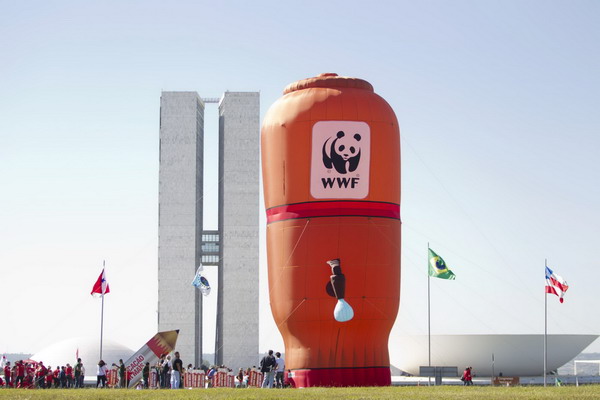Group criticizes global forest protection effort
Updated: 2011-07-25 17:34
(Agencies)
|
|||||||||||
|
 WWF members set up a balloon shaped like a water filter in front of the Brazilian National Congress, to call attention to the voting of the reform of the forestry code, in Brasilia May 11, 2011. [Photo/Agencies]
|
London-based Global Witness alleged in a report that some companies in Asia, Africa and Europe are allowed to reap benefits of associating with the World Wide Fund for Nature, which authored the project, while continuing to destroy forests and deal in illegally sourced timber.
The Switzerland-based WWF, one of the world's prominent environmental organizations, initiated the Global Forest and Trade Network 20 years ago to ensure that the increasing demand for wood is supplied by companies engaged in the legal, sustainable harvesting of forests.
WWF says its network links some 300 companies, communities and NGOs in more than 30 countries.
In a statement, WWF said the report contained a number of errors and misleading remarks and rejected its main allegations.
Global Witness said one network member, Malaysia's Ta Ann Holdings Berhad, has clear-cut rain forests at the equivalent rate of 20 football fields a day in an area that overlaps with WWF's own "Heart of Borneo" conservation project. The region, in Malaysia's Sarawak state, is home to orangutans, gibbons and clouded leopards.
"When a landmark scheme created in the name of sustainability and conservation tolerates one of its member companies destroying orangutan habitat, something is going seriously wrong," Tom Picken, a staffer at Global Witness, which investigates the corrupt exploitation of natural resources, said in a statement. It was one of the first to expose the "blood diamond" trade in Africa.
Ta Ann said in a statement Monday to The Associated Press that Global Witness' allegation was "incorrect and misinformed."
The company said it ensures that about 70 percent of the areas where it is licensed to operate are used as forest buffer zones and regulated for wildlife and biodiversity protection, adding that it excluded environmentally sensitive areas from its operations.
The report said one United Kingdom building supplier had failed to eliminate illegally sourced timber 10 years after joining the scheme and that the subsidiary of a Swiss-German company has been repeatedly involved in conflicts with local communities in the Democratic Republic of the Congo, resulting in human rights abuses.
Global Witness said the WWF project was "opaque, with little or no information in the public domain about the performance of individual participating companies, or the impact of the scheme itself." It called for an independent evaluation of the network's rules and its impact on forests and called on the WWF to "publicly disassociate itself from any company using timber from illegal or unethical sources."
In response to an earlier summary of its allegations, WWF on June 24 said the network had made "a major contribution to conservation ... in some of the most valuable and threatened forest areas." It said members make clear commitments to reject illegal or suspicious timber, regularly report their activities in detail and are suspended if found to be in breach of network rules.
WWF said that Ta Ann, which joined the effort in 2009, had previously acknowledged that most of its license areas could not be certified as sustainable, but that its operations subsequently improved and the company was thus retained as a member.
WWF said in its statement that it was "taking the allegations seriously and we intend to examine Global Witness' recommendations in detail."